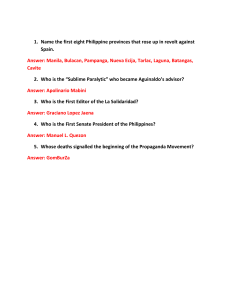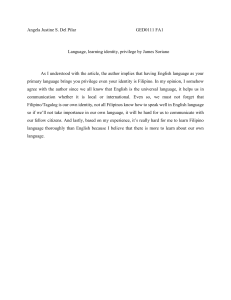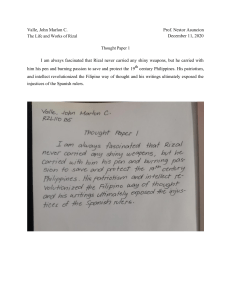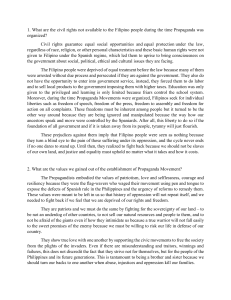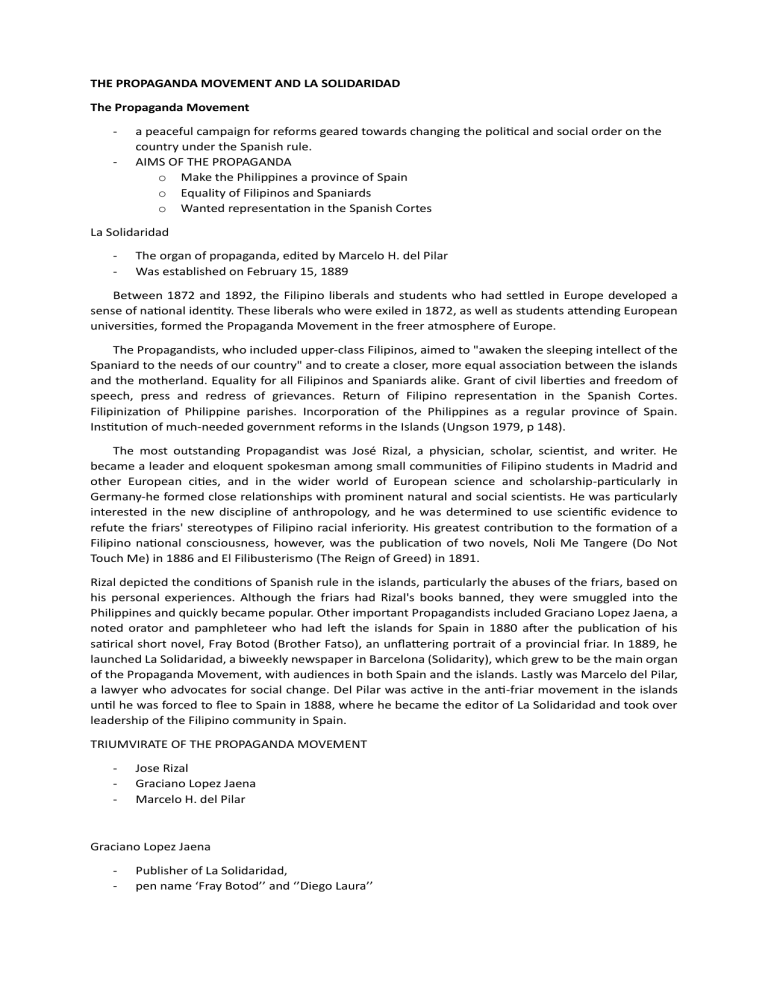
THE PROPAGANDA MOVEMENT AND LA SOLIDARIDAD The Propaganda Movement - a peaceful campaign for reforms geared towards changing the political and social order on the country under the Spanish rule. AIMS OF THE PROPAGANDA o Make the Philippines a province of Spain o Equality of Filipinos and Spaniards o Wanted representation in the Spanish Cortes La Solidaridad - The organ of propaganda, edited by Marcelo H. del Pilar Was established on February 15, 1889 Between 1872 and 1892, the Filipino liberals and students who had settled in Europe developed a sense of national identity. These liberals who were exiled in 1872, as well as students attending European universities, formed the Propaganda Movement in the freer atmosphere of Europe. The Propagandists, who included upper-class Filipinos, aimed to "awaken the sleeping intellect of the Spaniard to the needs of our country" and to create a closer, more equal association between the islands and the motherland. Equality for all Filipinos and Spaniards alike. Grant of civil liberties and freedom of speech, press and redress of grievances. Return of Filipino representation in the Spanish Cortes. Filipinization of Philippine parishes. Incorporation of the Philippines as a regular province of Spain. Institution of much-needed government reforms in the Islands (Ungson 1979, p 148). The most outstanding Propagandist was José Rizal, a physician, scholar, scientist, and writer. He became a leader and eloquent spokesman among small communities of Filipino students in Madrid and other European cities, and in the wider world of European science and scholarship-particularly in Germany-he formed close relationships with prominent natural and social scientists. He was particularly interested in the new discipline of anthropology, and he was determined to use scientific evidence to refute the friars' stereotypes of Filipino racial inferiority. His greatest contribution to the formation of a Filipino national consciousness, however, was the publication of two novels, Noli Me Tangere (Do Not Touch Me) in 1886 and El Filibusterismo (The Reign of Greed) in 1891. Rizal depicted the conditions of Spanish rule in the islands, particularly the abuses of the friars, based on his personal experiences. Although the friars had Rizal's books banned, they were smuggled into the Philippines and quickly became popular. Other important Propagandists included Graciano Lopez Jaena, a noted orator and pamphleteer who had left the islands for Spain in 1880 after the publication of his satirical short novel, Fray Botod (Brother Fatso), an unflattering portrait of a provincial friar. In 1889, he launched La Solidaridad, a biweekly newspaper in Barcelona (Solidarity), which grew to be the main organ of the Propaganda Movement, with audiences in both Spain and the islands. Lastly was Marcelo del Pilar, a lawyer who advocates for social change. Del Pilar was active in the anti-friar movement in the islands until he was forced to flee to Spain in 1888, where he became the editor of La Solidaridad and took over leadership of the Filipino community in Spain. TRIUMVIRATE OF THE PROPAGANDA MOVEMENT - Jose Rizal Graciano Lopez Jaena Marcelo H. del Pilar Graciano Lopez Jaena - Publisher of La Solidaridad, pen name ‘Fray Botod’’ and ‘’Diego Laura’’ Marcelo H. del Pilar - Editor and co-publisher of La Solidaridad Wrote under the name ‘’Plaridel, Dolores Manapat, Piping Dilat and Pupdoh’’ Antonio Luna - Wrote for La Solidaridad under the name ‘’Jomapa’’

